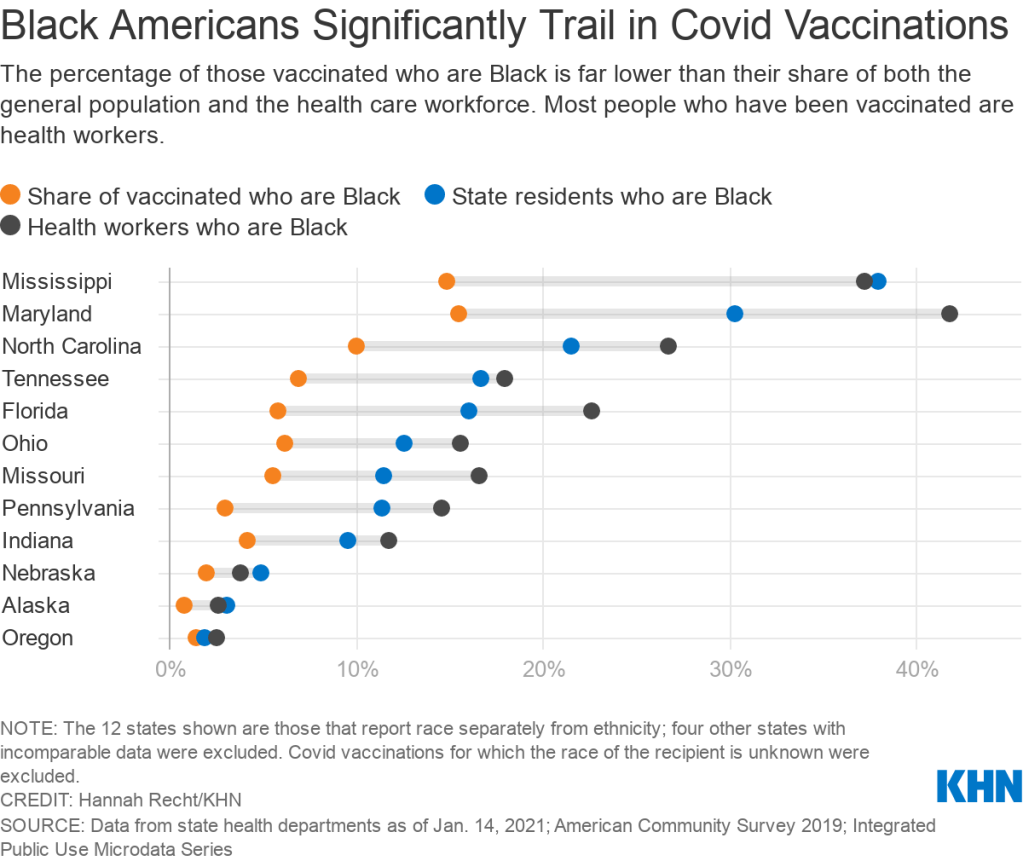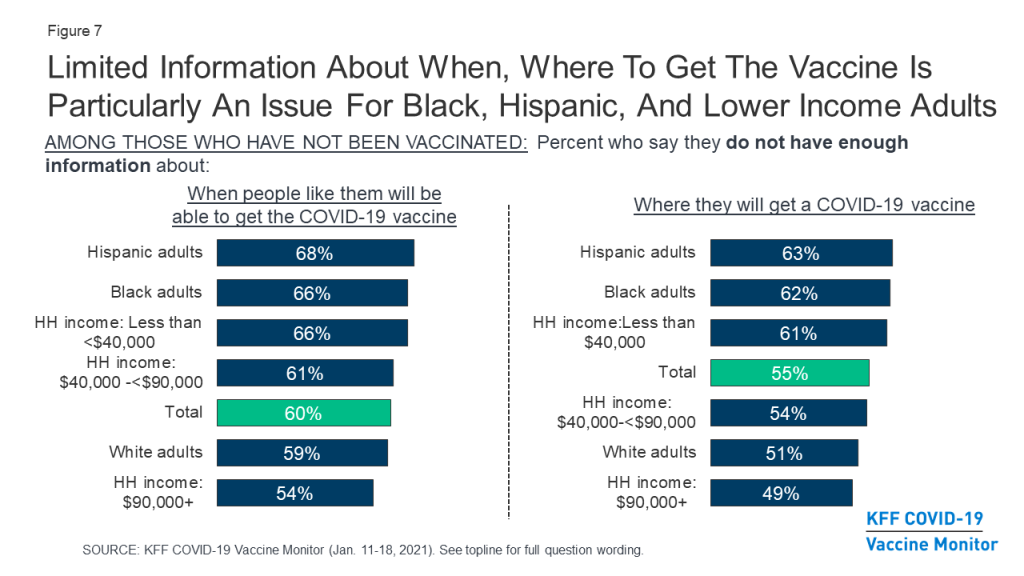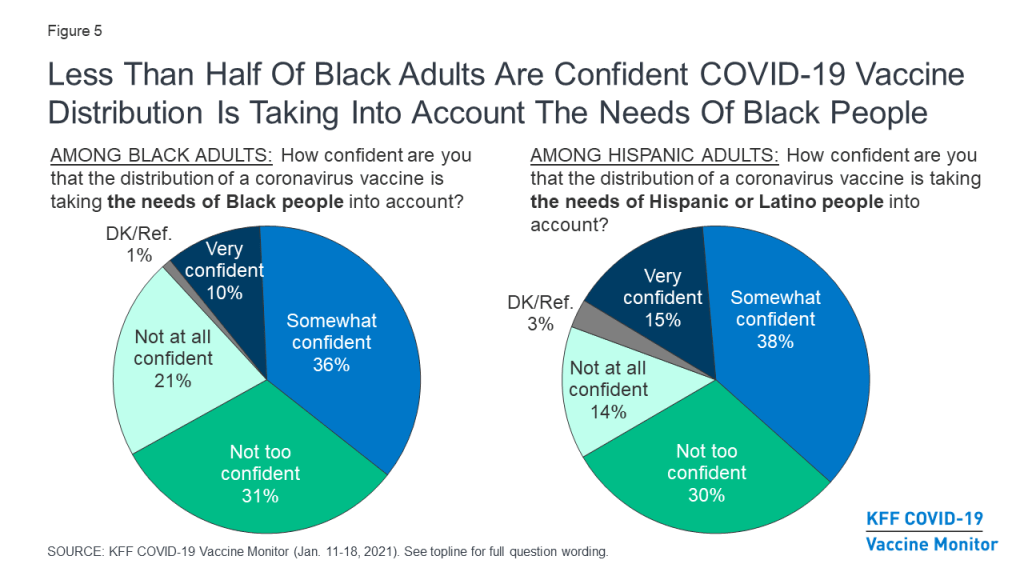Story at a glance
- In some states, there are reports that Black people are getting vaccinated at low rates compared to other groups.
- Surveys suggest low trust in the vaccines’ safety and efficacy.
- Experts suggest Black scientists and leaders share their stories to bring confidence up and reframe the conversation.
There is some evidence that Black people in the U.S. are getting vaccinated at lower rates than white people. For example, Kaiser Health News reports that “1.2% of white Pennsylvanians had been vaccinated as of Jan. 14, compared with 0.3% of Black Pennsylvanians” and “only 18% of those vaccinated in Mississippi so far are Black, in a state that’s 38% Black.”

If rollout was occurring as expected, the proportion of Black people getting the vaccine would be representative of how many Black people are in frontline health care and essential jobs. “My concern now is if we don’t vaccinate the population that’s highest-risk, we’re going to see even more disproportional deaths in Black and brown communities,” says Fola May, a UCLA physician and health equity researcher, to Kaiser Health News. “It breaks my heart.”
One study found that generally about 67 percent of people say they will get the vaccine. But that may be much lower for people in marginalized communities. A study by COVID Collaborative from Sept. 2020 found that 14 percent of Black respondents trust in COVID vaccine safety and 18 percent trust its efficacy.
WHAT YOU NEED TO KNOW ABOUT CORONAVIRUS RIGHT NOW
MASSIVE FIRE RAGES AT WORLD’S LARGEST COVID-19 VACCINE MANUFACTURER
NEW CDC DIRECTOR SAYS COVID-19 VACCINES MAY NOT BE IN EVERY PHARMACY BY FEBRUARY
IS BIDEN’S BOLD PROMISE TO VACCINATE 100 MILLION AMERICANS IN 100 DAYS POSSIBLE?
“We are missing the boat on equity,” says Marcus Plescia, who is chief medical officer at the Association of State and Territorial Health Officials, to Kaiser Health News. “If we don’t step back and address that, it’s going to get worse.”
Part of the issue is that people in minority groups may not be getting all the information they should have about where to get the vaccine and if they are eligible. In a survey conducted by the Kaiser Family Foundation from Jan. 11 to 18, the survey found that six out of 10 “Black and Hispanic adults say they do not have enough information about where to get the vaccine, compared to about half of White adults who say the same,” according to a press release.

The survey found that “about half of Black adults say they are ‘not too’ or ‘not at all’ confident that the vaccine distribution efforts are taking into account the needs of Black people (52%).” The survey found that overall two thirds of the adults who participated said they were confident that the vaccines were being distributed fairly in the U.S., with about 58 percent of Black respondents who agreed with that statement.

To understand what the needs of Black people may be, one needs to look back through history and the institutionalized racism and medical abuse that people in the Black and brown communities have experienced. Distrust in the medical community is not only linked to highly unethical studies that were performed on Black people but also poor treatment by medical professionals in everyday settings.
“Indeed, not every Black American is aware of these atrocities or would blame them for their distrust,” write Simar Singh Bajaj and Fatima Cody Stanford in the New England Journal of Medicine. “Yet every Black person knows their personal challenges in navigating health care institutions, perhaps even more so during this pandemic. Daily subtle mental assaults are more salient in explaining a lack of trust in medical institutions and, by extension, in Covid vaccines.”
Our country is in a historic fight against the Coronavirus. Add Changing America to your Facebook or Twitter feed to stay on top of the news.
The COVID Collaborative study found that respondents among Black Americans were twice as likely to trust a messenger of their own racial/ethnic group compared to a white counterpart. Bajaj and Stanford echo this message in their paper, saying that “we need more public health messaging coming directly from Black health leaders, a challenge given that only 5% of U.S. physicians are Black. Black scientists sharing their stories is paramount because they can more directly relate and speak to their communities’ needs.”
Getting vaccine confidence up among marginalized communities is currently the biggest challenge to getting vaccine adoption up, and it may take more public outreach efforts but also different perspectives. Debra Furr-Holden, who is Associate Dean for Public Health Integration at Michigan State University, writes for The Conversation, “If African Americans were honored and acknowledged in these COVID vaccine conversations and told ‘we need you’ instead of ‘you need us,’ perhaps more Blacks would trust the vaccine.”
For up-to-date information about COVID-19, check the websites of the Centers for Disease Control and Prevention and the World Health Organization. For updated global case counts, check this page maintained by Johns Hopkins University or the COVID Tracking Project.
You can follow Chia-Yi Hou on Twitter.
READ MORE LIKE THIS FROM CHANGING AMERICA
DATA SHOWS BLACK AMERICANS ARE PUNISHED MORE HARSHLY FOR COVID-19 VIOLATIONS
WAS THE CAPITOL RIOT A COVID-19 SUPERSPREADER EVENT?
WHAT EXPERTS ARE SAYING ABOUT VACCINATION EFFORTS
WHAT YOU NEED TO KNOW ABOUT THE CORONAVIRUS VARIANT IN SOUTH AFRICA
changing america copyright.